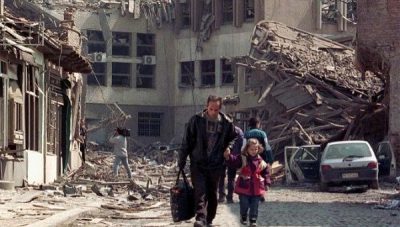Serbia and China Mark Anniversary of Embassy Bombing by NATO
The NATO bombing of Yugoslavia started on March 24, 1999. Over the course of 78 days, 2,500 people were killed and thousands of people more were wounded.

All Global Research articles can be read in 51 languages by activating the Translate Website button below the author’s name.
To receive Global Research’s Daily Newsletter (selected articles), click here.
Click the share button above to email/forward this article to your friends and colleagues. Follow us on Instagram and Twitter and subscribe to our Telegram Channel. Feel free to repost and share widely Global Research articles.
***
On Sunday, the Serbians and the Chinese gathered at the site of the bombed former Chinese Embassy in the Federal Republic of Yugoslavia in Belgrade to mark the 24th anniversary of the killing of three Chinese journalists in the North Atlantic Treaty Organization (NATO) aggression on Yugoslavia in 1999.
China’s Ambassador to Serbia Chen Bo, Serbian Minister of Sport Zoran Gajic, and dozens of officials and civilians laid wreaths and flowers at the memorial monument to honor the victims — Shao Yunhuan of Xinhua News Agency, and Xu Xinghu and his wife Zhu Ying of the Guangming Daily newspaper.
Gajic said that the Chinese Embassy bombing was a cowardly act conducted by the NATO aggressors, “in order to plant the seed of evil.”
“It is upon us to remember and recall and pray for all of those people who lost their lives, and also to pray for those who survived, and let them come to their senses, so we could pursue a brighter future, and become a happier humankind,” Gajic said.
Chen said that the martyrs of the bombing were “brutally killed,” but that 24 years later, a growing trend of peaceful development brings hope to humanity.
“Twenty-four years have passed, the international situation has undergone tremendous changes, and China and the world have also undergone earth-shaking changes. Although power politics and hegemonism are still the most profound root causes of today’s world turmoil, the forces committed to peaceful development are getting stronger,” she said.
"tHeY bOmbEd uS fOR nO rEAsoN" @KanekoaTheGreat I respect your work, but theres a decade of violence, war crimes, ethnic cleansing committed by the Serbs before NATO intervention..
Real Life Lore does a great analysis of the breakdown of Yugoslavia & NATO bombing of Serbia. pic.twitter.com/gaCfb1yarI
— Intel24News (@Intel24News) May 6, 2023
“Now more and more countries and people agree on the concept of a community with a shared future for mankind. I firmly believe that more and more countries and people will unite and work together to build a world of lasting peace and common prosperity,” Chen said.
The NATO bombing of Yugoslavia started on March 24, 1999. Over the course of 78 days, 2,500 people were killed and thousands of people more were wounded, while 25,000 homes and a third of the country’s energy sector were destroyed — often by illegal weapons such as cluster bombs and depleted uranium warheads.
On May 7, 1999, U.S.-led NATO forces carried out a brutal missile attack on the former Chinese Embassy in Belgrade, which left three journalists working there dead, more than 20 people injured, and the embassy building severely damaged.
In the place of the ruined embassy building now stands a Chinese Cultural Centre, overlooking two memorial monuments that memorialize the tragedy that took place here 24 years ago.
On NATO's 69 anniversary, let's take a look at the organization's "humanitarian interventions" over history. pic.twitter.com/aev5cLI43H
— teleSUR English (@telesurenglish) April 4, 2018
*
Note to readers: Please click the share button above. Follow us on Instagram and Twitter and subscribe to our Telegram Channel. Feel free to repost and share widely Global Research articles.
Featured image: People displaced as a result of the 1999 NATO bombing in Yugoslavia. | Photo: Twitter/ @KanekoaTheGreat

